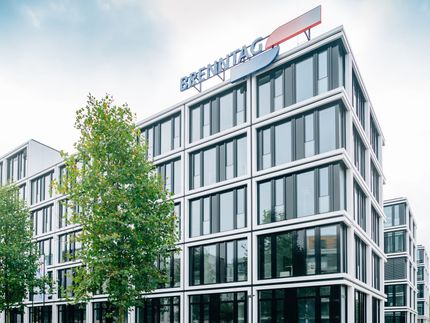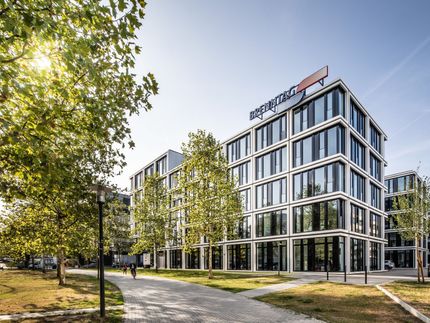Merck Sees Profit Jump in Q2
Net sales growth thanks to organic performance
Advertisement
Merck generated strong net sales growth in the second quarter of 2019, primarily on an organic basis. EBITDA pre grew very strongly and was also driven by organic performance. Merck confirmed its full-year forecast for 2019.
“We achieved sales growth in all business sectors and regions. The jump in earnings was due to the very good business performance of Life Science as well as the milestone payments in Healthcare. These payments are evidence of our successes in developing innovative medicines,” said Stefan Oschmann, Chairman of the Executive Board and CEO of Merck. “For the full year 2019, we continue to assume growth for the Group key figures, namely sales, EBITDA pre and EPS pre.”
In the second quarter, Merck generated net sales growth of 6.9% to € 4.0 billion (Q2 2018: € 3.7 billion). Organic sales growth amounted to 5.6%. Merck grew organically in all regions, with especially strong growth in Asia-Pacific, its largest reporting region. Sales also increased due to slightly positive exchange rate effects of 1.5%, which were primarily due to the U.S. dollar and the Japanese yen, as well as a slightly negative portfolio effect of -0.2%.
EBITDA pre, the Group’s most important earnings indicator, rose sharply by 23.8% to € 1.1 billion in the second quarter (Q2 2018: € 920 million). The increase primarily stemmed from organic growth of 20.3% and was driven by the milestone payments in Healthcare and the very good performance in Life Science. It was supported by positive exchange rate effects of 3.3% and slight portfolio effects of 0.3%. Accordingly, Group EBIT also grew very strongly, increasing by 57.6% to € 618 million (Q2 2018: € 392 million).
Net income of Merck thus soared in the second quarter by 90.8% to € 471 million (Q2 2018: € 247 million). Earnings per share increased to € 1.08 (Q2 2018: € 0.57). Earnings per share pre climbed by 25.2% to € 1.54 (Q2 2018: € 1.23).
Net financial debt of Merck as of June 30 increased by € 1.1 billion over December 31, 2018 to € 7.8 billion (Dec. 31, 2018: € 6.7 billion). The main reasons for this included the first-time application of the new accounting standard IFRS 16 as well as dividend payments.
Merck had 53,051 employees worldwide on June 30, 2019, compared with 54,009 on June 30, 2018. The decrease is primarily attributable to the divestment of the Consumer Health business, which closed in December 2018.
All business sectors contribute to sales growth in the first half
In the first six months of 2019, net sales of the Merck Group rose by 7.2% to € 7.7 billion (January-June 2018: € 7.2 billion). This positive sales development was mainly due to the organic sales increase of 5.7%, to which all three business sectors contributed. EBITDA pre rose by 9.6% to € 2.1 billion in the first six months of 2019 (January-June 2018: € 1.9 billion). At 8.9%, organic performance was also a main driver of the increase. The EBITDA pre margin increased slightly to 26.8% (January-June 2018: 26.2%). Earnings per share pre for the first half rose by 4.3% to € 2.67 (January-June 2018: € 2.56).
Healthcare milestone payments reflect R&D achievements
Sales by the Healthcare business sector grew organically in the second quarter by 5.2%. Including slightly positive foreign exchange effects of 0.7%, net sales of Healthcare amounted to € 1.7 billion (Q2 2018: € 1.6 billion). Organic growth was primarily driven by the General Medicine & Endocrinology franchise, Erbitux as well as the two new medicines Mavenclad and Bavencio; furthermore by the Fertility franchise.
Sales of Mavenclad, an oral medicine for the treatment of multiple sclerosis, tripled to € 61 million (Q2 2018: € 20 million), supported by regulatory approval in the United States at the end of March. The good performance of Mavenclad partly offset the declines in sales of Rebif. In the second quarter, sales of Rebif, which is used to treat relapsing forms of multiple sclerosis, declined organically by -16.1%, particularly as a result of the persistently challenging competitive environment in North America. Including currency tailwinds of 2.5%, Rebif sales amounted to
€ 331 million (Q2 2018: € 383 million). Sales of the immuno-oncology drug Bavencio totaled € 23 million (Q2 2018: € 17 million). Sales of the oncology drug Erbitux grew organically by 5.7%; the addition of Erbitux to the National Reimbursement Drug List in China was a major driver of the good development of Erbitux sales in Asia. Including negative foreign exchange effects, sales amounted to € 212 million (Q2 2018: € 203 million). Gonal-f, the leading recombinant hormone for the treatment of infertility, saw organic growth of 2.8%, generating sales of € 191 million (Q2 2018: € 184 million). The General Medicine & Endocrinology franchise, which commercializes medicines to treat cardiovascular diseases, thyroid disorders, diabetes and growth disorders, among other things, generated very strong organic growth of 10.1%, yielding net sales of € 640 million (Q2 2018: € 580 million). Delivering organic sales growth of 31.9% primarily thanks to demand in China, the diabetes medicine Glucophage was the main driver of this development.
EBITDA pre of Healthcare rose organically in the second quarter by 37.3%. Including a slightly positive exchange rate effect of 2.2%, it amounted to € 528 million (Q2 2018: € 379 million). It included multiple milestone payments. This demonstrates the achievements of Merck in the discovery and development of innovative medicines. On May 15, the U.S. Food and Drug Administration (FDA) granted regulatory approval of Bavencio in combination with axitinib as a first-line therapy in patients with advanced renal cell carcinoma (RCC). For this, Merck received a milestone payment of around € 35 million from its alliance partner Pfizer. The upfront payment amounting to € 300 million from the alliance with GlaxoSmithKline to co-develop and commercialize the immunotherapy bintrafusp alfa also had a positive effect of € 31 million in the second quarter. Merck also received a milestone payment of € 75 million from BioMarin Pharmaceutical in connection with the sale of the rights to Palynziq (Peg-Pal) in 2016.
Life Science increases profitability thanks to strong organic growth
In the second quarter, the Life Science business sector generated very strong organic sales growth of 9.0%, which was driven by all three business units. Favorable exchange rate effects increased sales by 2.1%; the divestment of the Flow Cytometry business lowered sales by -0.6%. In the second quarter, sales by the Life Science business sector rose overall by 10.5% to € 1.7 billion (Q2 2018: € 1.5 billion).
The Process Solutions business unit, which markets products and services for the entire pharmaceutical production value chain, generated organic sales growth of 16.2% in the second quarter. Net sales of Process Solutions, including a positive foreign exchange impact of 2.7%, totaled € 743 million in the second quarter (Q2 2018: € 625 million).
The Research Solutions business unit, which provides products and services to support life science research for pharmaceutical, biotechnological and academic research laboratories, generated organic sales growth of 3.7%. Including positive foreign exchange effects of 1.9%, net sales of the business unit amounted to
€ 546 million (Q2 2018: € 517 million). With its broad range of products for researchers as well as scientific and industrial laboratories, the Applied Solutions business unit recorded organic sales growth of 4.4% in the second quarter. The divestment of the Flow Cytometry business led to a negative portfolio effect of
-2.1%. Supported by positive foreign exchange effects of 1.6%, Applied Solutions generated net sales of € 416 million in the second quarter (Q2 2018: € 401 million).
In the second quarter, EBITDA pre of the Life Science business sector increased by 18.0% to € 533 million (Q2 2018: € 452 million); this increase was mainly driven by very strong organic growth of 16.7%. The EBITDA pre margin of Life Science improved to 31.3% (Q2 2018: 29.3%).
Performance Materials sees slight sales growth again in Q2
In the second quarter, net sales of the Performance Materials business sector increased by 0.4% to € 589 million (Q2 2018: € 587 million). An organic decline of -2.0% was more than offset by positive foreign exchange effects of 2.4%.
Owing to market softness, sales in the Semiconductor Solutions business unit, which comprises the business with materials used in semiconductor production, declined organically in the second quarter and totaled € 146 million. Overall, customer processing of silicon wafers remained below expectations against the backdrop of continued global economic uncertainty. In the second quarter, the Surface Solutions business unit generated sales of € 118 million, which was in line with expectations, not least due to positive foreign exchange effects. The Surface Solutions business declined organically, among other things owing to sustained weak demand in the automotive segment. At € 325 million, sales by the Display Solutions business unit remained stable in the second quarter while still showing slight organic growth. Amid persistent price pressure, the business with liquid crystal technologies benefited further from projects by panel makers in China to build up production capacities. However, the effects stemming from these projects declined in comparison with previous quarters, as expected. By contrast, the OLED materials business experienced lively demand.
EBITDA pre of Performance Materials fell in the second quarter by -2.8% to € 190 million (Q2 2018: € 196 million). The organic decline of -8.4% resulted primarily from price decreases. This was partly offset by favorable foreign exchange effects of 5.6%. Consequently, at 32.3%, the EBITDA pre margin was also below the year-earlier figure (Q2 2018: 33.4%), however it exceeded the long-term target of around 30%.
Merck made progress with its planned acquisitions of the U.S. companies Versum Materials for approximately US$ 6.5 billion and Intermolecular for approximately US$ 62 million. Merck aims to become a leading supplier in the electronic materials sector benefiting from attractive, sustainable growth trends. On June 17, Versum shareholders approved the transaction with Merck at a special meeting; on July 17 Intermolecular shareholders followed suit. Both transactions are expected to close in the second half of 2019, subject to regulatory clearances and the satisfaction of other customary closing conditions. In addition, Merck remains true to its conservative financial policy and made use of the favorable market environment in order to finalize the financing for the Versum transaction. To finance the Versum purchase price, Merck had already successfully placed a hybrid bond in two tranches amounting to € 1.5 billion on June 18 as well as a bond in three tranches amounting to € 2 billion on July 1, 2019.
Merck confirms full-year forecast
Following a solid first half that was in line with expectations, Merck continues to forecast for the full year 2019 a moderate organic net sales increase of +3% to +5% over the previous year. Overall, net sales of the Merck Group in 2019 are still expected to be in a range between € 15.3 billion and € 15.9 billion (2018:
€ 14.836 billion). According to the company’s expectations, in 2019 Group EBITDA pre will still be in a corridor between € 4.15 billion and € 4.35 billion (2018: € 3.80 billion). Merck confirms its original expectation of a strong organic increase of +10% to +13% in EBITDA pre compared with the previous year and continues to expect a slightly positive foreign exchange effect of 0% to +2% compared with the previous year.





























































